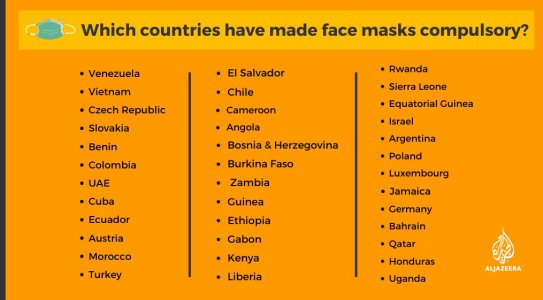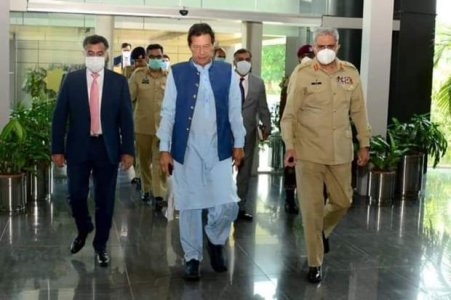- Joined
- Oct 2, 2004
- Runs
- 217,912
The UK government is set to recommend that the use of scarves or homemade cloth coverings could prevent the spread of coronavirus in some circumstances but will stop short of forcing people to use them in public.
Ministers will continue to discourage the general population from using medical face masks because they do not want to jeopardise the supplies of professional equipment to frontline health workers.
Scientists on the Sage panel of government advisers met on Tuesday and their advice is set to be presented to ministers on Thursday, with an announcement expected before the weekend.
The experts have concluded that cloth masks could help stop an asymptomatic person from infecting others in a closed environment, such as offices or public transport.
But they do not believe that cloth masks would be of much use in parks or other public spaces.
Wearing them can slow the transmission of the virus, by catching droplets of sneezes or coughs, but is not likely to prevent someone from catching the infection from another person.
The new advice on face coverings is expected to be voluntary when ministers announce revised guidance in the next two days, according to government figures.
Lifesaver or false protection: do face masks stop coronavirus?
Both scientists and ministers will emphasise that anyone exhibiting symptoms of Covid-19 should isolate “full stop”. “A cloth mask is not a replacement for staying at home and nobody should think otherwise,” said one senior government figure.
There has been a discussion in Whitehall for weeks over what to recommend regarding face masks.
Britain does not produce in large quantities the kind of disposable face masks that have become commonplace in Asia since the Sars epidemic in 2002-03 and would struggle to import more in large quantities given a surge in global demand.
Because of this, senior ministers are concerned that the widespread use of masks would divert resources from National Health Service staff while the medical benefits of their use for the general public is still in dispute.
Matt Hancock, health secretary, said on Wednesday that it would not be practical to provide facial protection for everyone. “I can’t promise we will give everybody face masks — that would be an extraordinary undertaking,” he said.
Instead, Mr Hancock told MPs that his focus was ensuring protective equipment reached frontline health and care staff.
Martin Marshall, chair of the Royal College of General Practitioners, told the BBC Radio 4 Today programme on Thursday there was “no research evidence” to support wearing a mask for healthy people. People could be at “higher risk of picking up infection” from wearing a mask because they could touch their face more, he pointed out.
However if someone is “coughing and spluttering then it makes complete sense to wear one to protect other people”, he said.
The World Health Organization still says there is no evidence to support the use of face masks by the general population — and that they should be reserved for crucial health workers.
But their use is increasing in other countries, with the German state of Saxony making their use compulsory in shops and public transport. The French government has promised to distribute masks to the public when lockdown measures cease in the coming months.
Sadiq Khan, the Labour mayor of London, last week suggested that rather than using medical face masks people travelling on the London Underground should wear bandannas or scarves around their faces to prevent themselves from unwittingly transmitting coronavirus to other people.
Keir Starmer, the Labour leader, repeated that call on Wednesday although he said ministers should follow scientific advice.
One expert told the Financial Times that the current evidence on the effectiveness of face coverings was based on the transmission of flu, meaning there is “no science” on whether it helps prevent coronavirus.
“The government will also have to take account of whether a rush to obtain masks will exacerbate a shortage in hospitals,” he said. “Even if people are told that bandannas, scarves and handkerchiefs are adequate substitutes, some will want to get hold of the real thing.”
https://www.ft.com/content/221e7d83-b2ac-415d-8462-94ef7178b174
Ministers will continue to discourage the general population from using medical face masks because they do not want to jeopardise the supplies of professional equipment to frontline health workers.
Scientists on the Sage panel of government advisers met on Tuesday and their advice is set to be presented to ministers on Thursday, with an announcement expected before the weekend.
The experts have concluded that cloth masks could help stop an asymptomatic person from infecting others in a closed environment, such as offices or public transport.
But they do not believe that cloth masks would be of much use in parks or other public spaces.
Wearing them can slow the transmission of the virus, by catching droplets of sneezes or coughs, but is not likely to prevent someone from catching the infection from another person.
The new advice on face coverings is expected to be voluntary when ministers announce revised guidance in the next two days, according to government figures.
Lifesaver or false protection: do face masks stop coronavirus?
Both scientists and ministers will emphasise that anyone exhibiting symptoms of Covid-19 should isolate “full stop”. “A cloth mask is not a replacement for staying at home and nobody should think otherwise,” said one senior government figure.
There has been a discussion in Whitehall for weeks over what to recommend regarding face masks.
Britain does not produce in large quantities the kind of disposable face masks that have become commonplace in Asia since the Sars epidemic in 2002-03 and would struggle to import more in large quantities given a surge in global demand.
Because of this, senior ministers are concerned that the widespread use of masks would divert resources from National Health Service staff while the medical benefits of their use for the general public is still in dispute.
Matt Hancock, health secretary, said on Wednesday that it would not be practical to provide facial protection for everyone. “I can’t promise we will give everybody face masks — that would be an extraordinary undertaking,” he said.
Instead, Mr Hancock told MPs that his focus was ensuring protective equipment reached frontline health and care staff.
Martin Marshall, chair of the Royal College of General Practitioners, told the BBC Radio 4 Today programme on Thursday there was “no research evidence” to support wearing a mask for healthy people. People could be at “higher risk of picking up infection” from wearing a mask because they could touch their face more, he pointed out.
However if someone is “coughing and spluttering then it makes complete sense to wear one to protect other people”, he said.
The World Health Organization still says there is no evidence to support the use of face masks by the general population — and that they should be reserved for crucial health workers.
But their use is increasing in other countries, with the German state of Saxony making their use compulsory in shops and public transport. The French government has promised to distribute masks to the public when lockdown measures cease in the coming months.
Sadiq Khan, the Labour mayor of London, last week suggested that rather than using medical face masks people travelling on the London Underground should wear bandannas or scarves around their faces to prevent themselves from unwittingly transmitting coronavirus to other people.
Keir Starmer, the Labour leader, repeated that call on Wednesday although he said ministers should follow scientific advice.
One expert told the Financial Times that the current evidence on the effectiveness of face coverings was based on the transmission of flu, meaning there is “no science” on whether it helps prevent coronavirus.
“The government will also have to take account of whether a rush to obtain masks will exacerbate a shortage in hospitals,” he said. “Even if people are told that bandannas, scarves and handkerchiefs are adequate substitutes, some will want to get hold of the real thing.”
https://www.ft.com/content/221e7d83-b2ac-415d-8462-94ef7178b174
Last edited:











